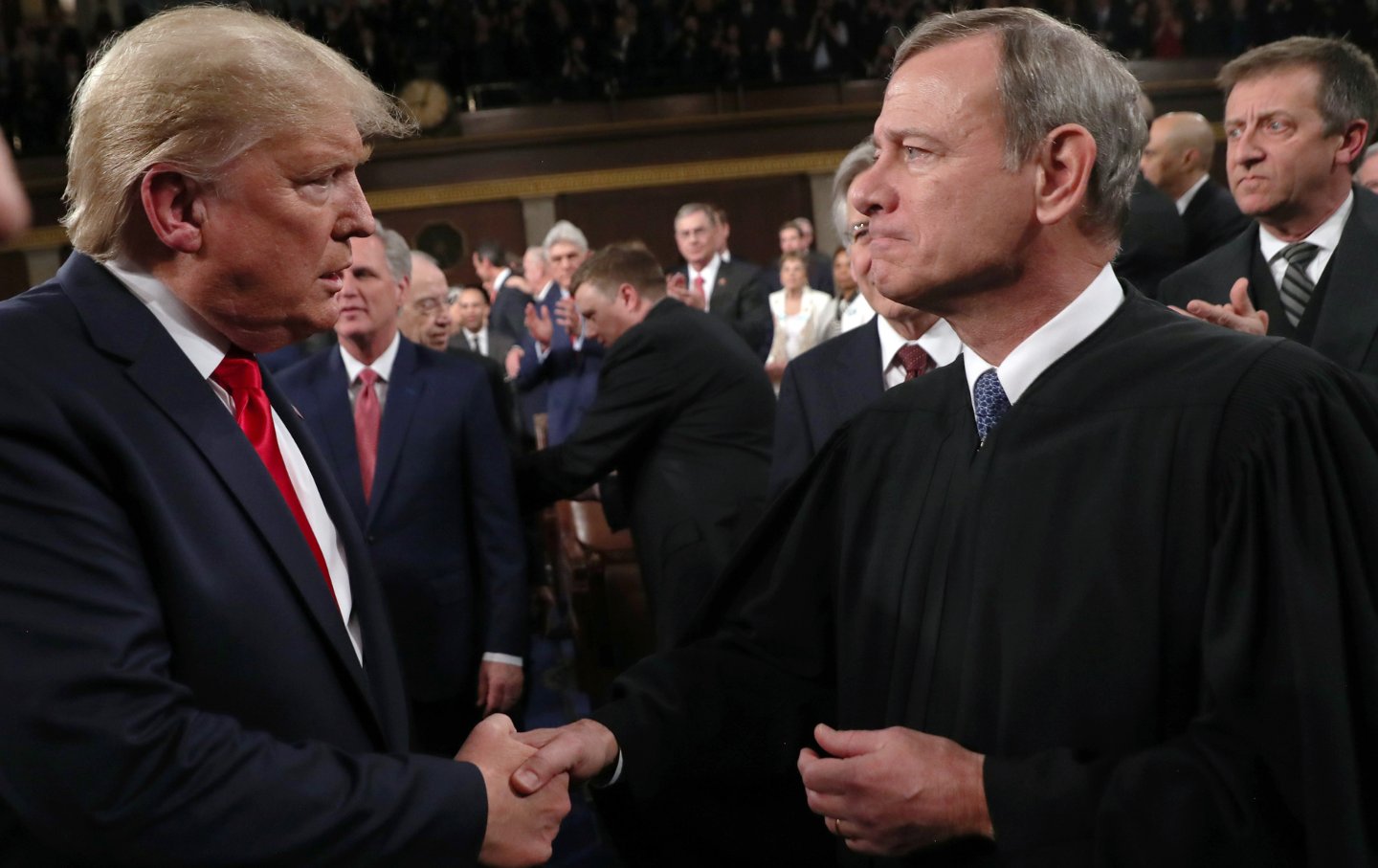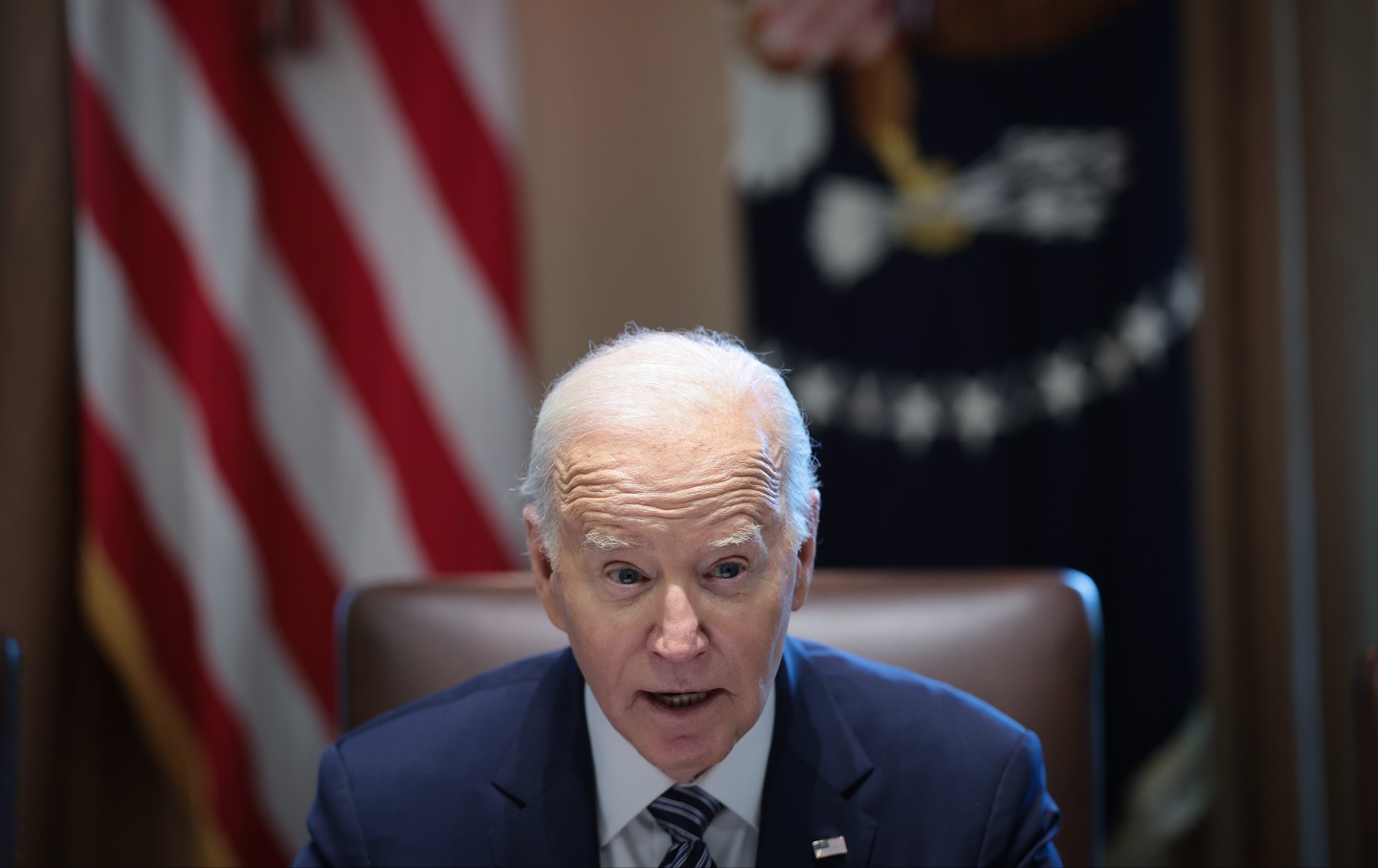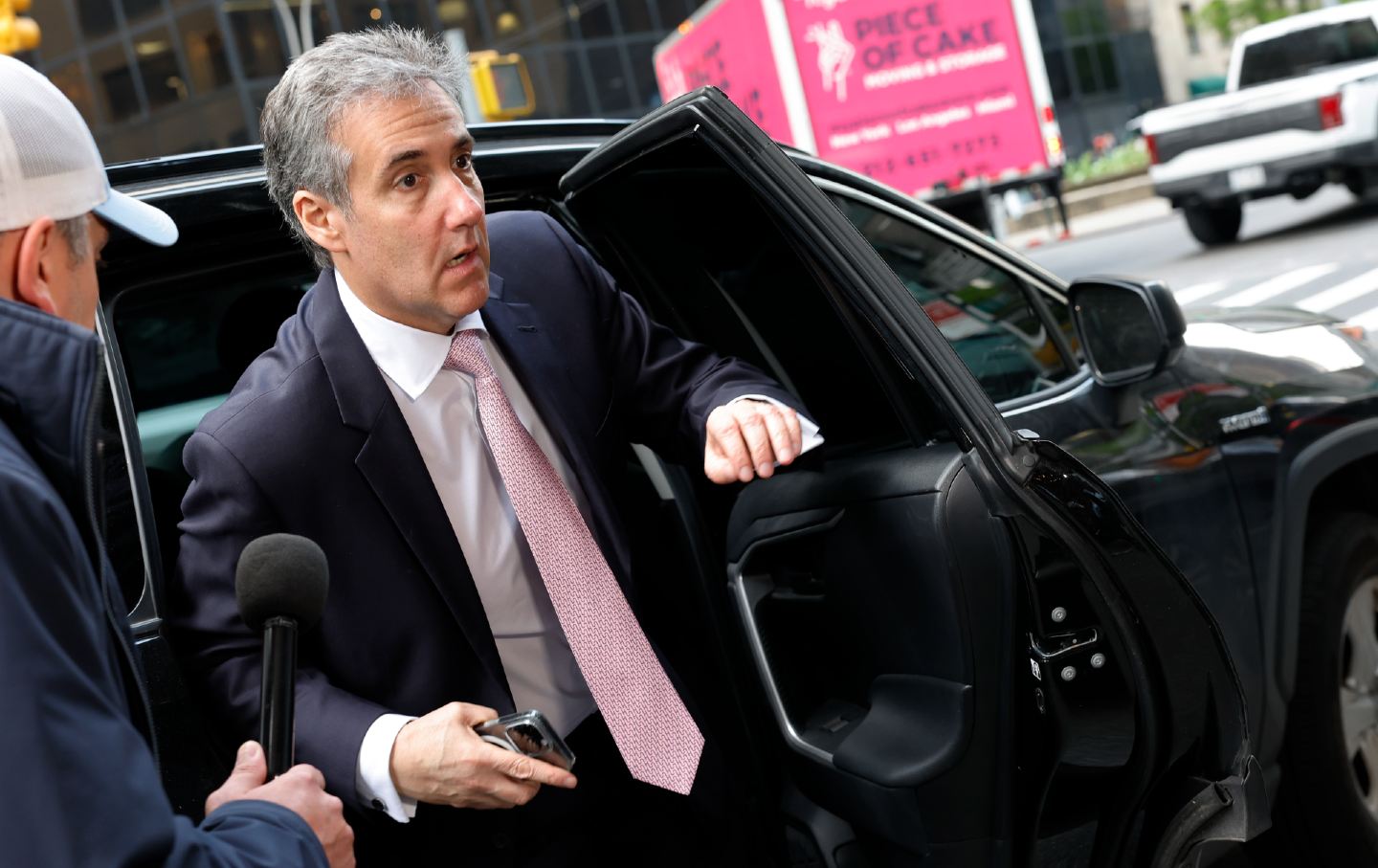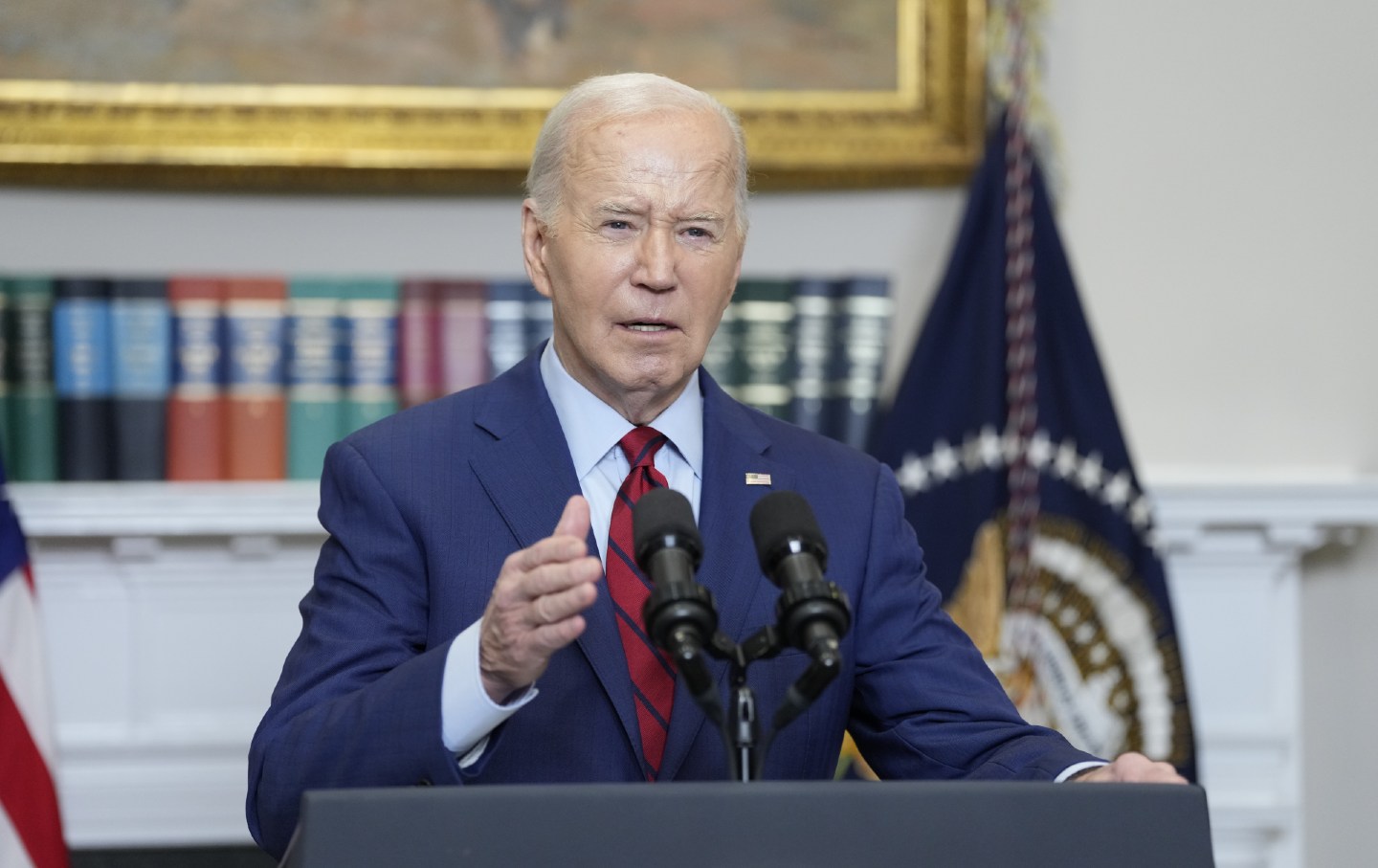The Supreme Court Just Rejected the Constitution to Help Donald Trump
The court’s ruling that states can’t remove Trump from the ballot flies in the face of the 14th Amendment’s crystal-clear language.

President Donald Trump shakes hands with Supreme Court Chief Justice John Roberts before the State of the Union address in the House chamber on February 4, 2020, in Washington, D.C.
(Leah Millis-Pool / Getty Images)Article 14, Section 3 of the US Constitution is blunt and direct. It declares, “No person shall be a Senator or Representative in Congress, or elector of President and Vice President, or hold any office, civil or military, under the United States, or under any state, who, having previously taken an oath, as a member of Congress, or as an officer of the United States, or as a member of any state legislature, or as an executive or judicial officer of any state, to support the Constitution of the United States, shall have engaged in insurrection or rebellion against the same, or given aid or comfort to the enemies thereof.”
“The plain text of the Constitution could not be any clearer,” says Maryland US Representative Jamie Raskin, the constitutional law scholar who served as lead impeachment manager for the second trial of former President Donald Trump for high crimes and misdemeanors, and who then joined the bipartisan Select Committee to Investigate the January 6th Attack on the United States Capitol. “If you’ve sworn an oath to support the Constitution and you violate that oath by engaging in insurrection or rebellion,” explains Raskin, you’re disqualified. “That’s what the Constitution itself says.”
But even the straightforward language of the Constitution is no match for John Roberts’s Supreme Court. On Monday, Roberts and his fellow justices—conservatives and liberals alike—embraced a reading of the amendment that cleared the way for Trump to seek a second term. Trump now has an even better chance to reoccupy the White House he disgraced and endangered when he abandoned his oath of office and sought to overturn the results of the 2020 presidential election.
Worse yet, the court’s conservative majority went even further, dramatically narrowing the utility of the amendment for holding insurrectionists to account. That led Justices Sonia Sotomayor, Elena Kagan, and Ketanji Brown Jackson to warn that the ruling went so far beyond the specifics of the Colorado case that it could foreclose future efforts to impose accountability on insurrectionists. “The Court continues on to resolve questions not before us. In a case involving no federal action whatsoever, the Court opines on how federal enforcement of Section 3 must proceed,” Justices Sotomayor, Kagan, and Jackson wrote. ‘“These musings are as inadequately supported as they are gratuitous.”
They concluded:
Section 3 serves an important, though rarely needed, role in our democracy. The American people have the power to vote for and elect candidates for national office, and that is a great and glorious thing. The men who drafted and ratified the Fourteenth Amendment, however, had witnessed an “insurrection [and] rebellion” to defend slavery. They wanted to ensure that those who had participated in that insurrection, and in possible future insurrections, could not return to prominent roles. Today, the majority goes beyond the necessities of this case to limit how Section 3 can bar an oathbreaking insurrectionist from becoming President. Although we agree that Colorado cannot enforce Section 3, we protest the majority’s effort to use this case to define the limits of federal enforcement of that provision. Because we would decide only the issue before us, we concur only in the judgment.
Justice Amy Coney Barrett wrote a separate concurrence that essentially agreed with the liberals but suggested they were too urgent in expressing their concerns.
The immediate impact of the overall decision was to deliver another judicial win for Trump.
The same jurists who last week stalled out Trump’s federal criminal trial on charges related to those efforts to overturn the election results moved with alacrity on Monday to ensure that the 14th Amendment poses no barrier to Trump’s access to the ballot—even in states where courts and election officials have determined that the twice-impeached former president disqualified himself with his insurrectionist agitation around January 6, 2021.
That goes for Colorado, where the state Supreme Court found that Trump was disqualified from the state ballot, and in so doing began the process that brought this matter to the high court. That goes for Maine, where the secretary of state disqualified the candidate who is now all but certain to be the Republican Party’s 2024 nominee. That goes for Illinois, where a lower court found reason to disqualify Trump. That goes for every state and the District of Columbia.
No matter what the Constitution says, no matter what legal scholars, current and former jurists, and experienced election officials may say, Trump is back in the game—thanks to the Supreme Court, where justices are given life tenure so that they do not bend to the political demands of the moment. In this case, while they offered several different arguments for the decision, all nine justices decided that they did not need to apply the clear language of the Constitution to Donald Trump.
How so?
The court concluded in its ruling on the Colorado case that the Constitution gives Congress alone the power to decide whether a person who engaged in an insurrection, or who gave aid and comfort to insurrectionists, can seek and hold federal office.
The Constitution does not make that assertion. But the court, in a fresh act of adventurous interpretation, ruled, “Because federal officers ‘owe their existence and functions to the united voice of the whole, not of a portion, of the people,’ powers over their election and qualifications must be specifically ‘delegated to, rather than reserved by, the States.’ But nothing in the Constitution delegates to the States any power to enforce Section 3 against federal officeholders and candidates.”
That may sound appropriate, but only if you neglect the reality of how states have historically made determinations regarding the long list of qualifications for presidential and congressional candidates outlined in the nation’s founding document.
The Constitution sets up several hurdles for potential presidential contenders. These requirements are spread throughout the document: some at the beginning where the framework of the federal government was spelled out, and others added as circumstances demanded.
For instance, Article II, Section 1, Clause 5 of the Constitution declares, “No Person except a natural born Citizen, or a Citizen of the United States, at the time of the Adoption of this Constitution, shall be eligible to the Office of President; neither shall any Person be eligible to that Office who shall not have attained to the Age of thirty five Years, and been fourteen Years a Resident within the United States.”
Read further and you will find Section 1 of the 22nd Amendment, which establishes a term limit for presidential candidates. It explains, “No person shall be elected to the office of the President more than twice, and no person who has held the office of President, or acted as President, for more than two years of a term to which some other person was elected President shall be elected to the office of the President more than on.”
And then there’s Section 3 of the 14th, which was adopted after the Civil War to prevent Confederates from retaking position in the government they revolted against. It establishes that proponents of insurrection, in 1861 or 2021, are disqualified.
Popular
“swipe left below to view more authors”Swipe →As I noted before the hearing on the Colorado case, the work of interpreting these requirements does not require a Raskin-level background in constitutional law. For instance, the name of US Representative Maxwell Alejandro Front, the Florida Democrat who is the youngest member of Congress, cannot be placed on a presidential ballot this year because, at 27, he does not meet the age requirement. No congressional resolution or court ruling is necessary to settle the issue. Reality is sufficient. And the name of Barack Obama cannot be placed on a presidential ballot this year because, as someone who has already served two full terms in the Oval Office, he is not allowed to bid again. No congressional resolution or court ruling is necessary to settle the issue. Reality is sufficient.
Similarly, as legal scholars such as former US Court of Appeals judge J. Michael Luttig and Harvard Law School professor Laurence Tribe have argued, a good-faith reading of the Constitution would find that the name of Donald Trump cannot be placed on a presidential ballot this year. That’s because, as the January 6 Committee determined, “President Trump or his inner circle engaged in at least 200 apparent acts of public or private outreach, pressure, or condemnation, targeting either State legislators or State or local election administrators, to overturn State election results.” No congressional resolution or court ruling is necessary to settle the issue. Reality is sufficient.
Except in the eyes of the US Supreme Court, which has suddenly determined, in the year when Donald Trump is seeking a second term, that states can no longer be trusted to apply the Constitution when determining which candidates get a place on the ballot, and which are disqualified.
“This decision is disgraceful,” said Ron Fein, legal director of Free Speech For People, a group that has brought a number of Trump-related cases under Section 3 of the Fourteenth Amendment. “The Supreme Court couldn’t exonerate Trump because the evidence of his guilt was overwhelming, so instead the justices neutered our Constitution’s built-in defense against insurrectionists and said the facts don’t matter.”
Thank you for reading The Nation!
We hope you enjoyed the story you just read, just one of the many incisive, deeply reported articles we publish daily. Now more than ever, we need fearless journalism that moves the needle on important issues, uncovers malfeasance and corruption, and uplifts voices and perspectives that often go unheard in mainstream media.
Donate right now and help us hold the powerful accountable, shine a light on issues that would otherwise be swept under the rug, and build a more just and equitable future.
For nearly 160 years, The Nation has stood for truth, justice, and moral clarity. As a reader-supported publication, we are not beholden to the whims of advertisers or a corporate owner. But it does take financial resources to report on stories that may take weeks or months to investigate, thoroughly edit and fact-check articles, and get our stories to readers like you.
Donate today and stand with us for a better future. Thank you for being a supporter of independent journalism.
Thank you for your generosity.
More from The Nation

It’s Not Too Late for Democrats to Win Back Rural Voters It’s Not Too Late for Democrats to Win Back Rural Voters
Putting together a Democratic majority in 2024 requires winning back some portion of the rural working class. The good news is that it can be done. Here’s how.

Don’t Believe the Pundits: Gaza Is a Political Disaster for Biden Don’t Believe the Pundits: Gaza Is a Political Disaster for Biden
Some observers say the war isn’t that big a deal in the 2024 campaign. Here’s why they’re so wrong.

Angela Alsobrooks Beat the Big Money. Now She Has to Beat the Big Republican. Angela Alsobrooks Beat the Big Money. Now She Has to Beat the Big Republican.
Maryland’s new Democratic US Senate nominee won a bitterly contested primary. Now, she has an even tougher fight on her hands.

The Media Keeps Asking the Wrong Questions About Biden and the “Uncommitted” Vote The Media Keeps Asking the Wrong Questions About Biden and the “Uncommitted” Vote
Expecting voters to support the person with the power to stop the killing of their families, but who refuses to use it, is asking the impossible. This is about now, not November.

Michael Cohen’s Testimony Reveals the Sad Life of a Trump Toady Michael Cohen’s Testimony Reveals the Sad Life of a Trump Toady
Trump’s former lawyer described in court how the former president demands total sycophancy from his underlings.

Biden’s Domestic Reforms Don’t Add Up to the Great Society Biden’s Domestic Reforms Don’t Add Up to the Great Society
But they do signal that government can make life tangibly better.


